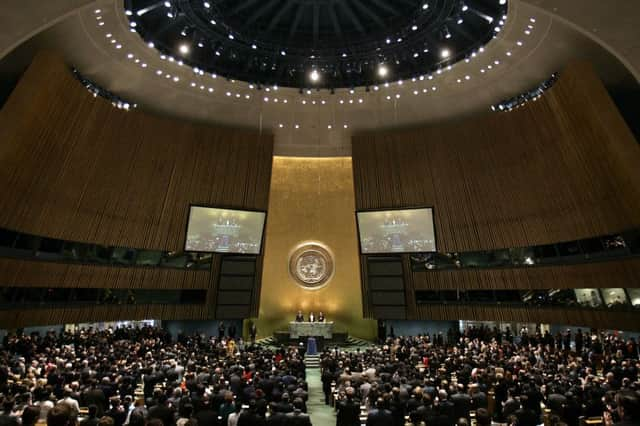Political courage needed on tackling inequality
This article contains affiliate links. We may earn a small commission on items purchased through this article, but that does not affect our editorial judgement.


In less than two weeks, leaders from 193 states will meet at the United Nations in New York to formally adopt, in effect, a new plan to fight extreme poverty, tackle inequality and end hunger.
The Sustainable Development Goals (SDGs) will replace the Millennium Development Goals (MDGs), which ran from 2000 to 2015 – both being an ambitious attempt to go beyond sticking-plaster solutions to address the root causes of poverty.
Advertisement
Hide AdAdvertisement
Hide AdWith 17 goals and 169 targets, the SDGs will be complicated, but so too is poverty. Oxfam has been working with other organisations, to ensure that, once agreed, the SDGs are more comprehensive and far-reaching than the MDGs they replace.
The level of ambition is encouragingly high: extreme poverty will be eradicated, not just reduced, by 2030 with a welcome and much-needed promise to “leave no-one behind”. The goal to “end hunger” is also a very positive commitment, but it will be impossible to deliver unless we get serious about tackling climate change – starting with a strong agreement at the Paris Climate Summit in December.
The goals will also recognise that women often suffer most from extreme poverty and inequality.
One crucial difference is that, unlike the MDGs, the new SDGs will not only apply to developing countries, they will apply everywhere. We therefore warmly welcome the Scottish Government’s recent confirmation that Scotland will commit to delivering the SDGs.
This is an important signal of intent and builds on the government’s recent focus on tackling inequality here in Scotland. We very much hope this commitment will receive cross-party support.
As well as addressing poverty and inequality at home, we must also take our share of responsibility for addressing these challenges globally. Inequality has reached extreme levels: on current trends the richest 1 per cent of people in the world will have the same wealth as the other 99 per cent of the population put together by 2016.
We believe such extreme inequality risks undoing much of the progress we have made in tackling extreme poverty, which has been halved in just 15 years.
Meeting the wide-ranging and ambitious SDGs will require sufficient and sustained funding. Yet, at the recent UN financing for development conference in Ethiopia, other wealthy governments failed to follow the UK’s lead by committing 0.7 per cent of GDP to foreign aid.
Advertisement
Hide AdAdvertisement
Hide AdA weak compromise also means rigged tax rules and tax avoidance will continue to rob the world’s poorest people of crucial revenue – the International Monetary Fund estimate developing countries lose around $100 billion each year from corporate tax avoidance.
Of course, Scotland cannot plug the finance gap alone – but it can contribute. Since it was launched in 2005, the Scottish Government’s International Development Fund has made a significant difference.
Today, it is worth £9 million per year and supports projects in Malawi, Rwanda, Tanzania, Zambia, Pakistan, India and Bangladesh. However, it has been frozen in cash terms at £9m for six years – in real terms this means its value has been diminished by 8.6 per cent.
The fund is, of course, additional to the contribution made by Scottish taxpayers to UK government aid spending, and is complemented by the Scottish Government’s climate justice fund and their contributions to overseas emergency appeals.
While we recognise domestic funding pressures, we must prevent the International Development Fund from losing value so it continues to supports as many people as possible.
Meanwhile, we must close the extreme inequality gap in Scotland in order to reduce the poverty blighting the lives of nearly one in five people in our rich country.
In recent months, we have seen the appointment of Naomi Eisentstadt as Scotland’s first poverty and inequality adviser, and the launch of the national discussion on how to create a fairer Scotland. The work, wages and wellbeing inquiry begun by the Scottish Parliament’s economy committee is also looking at ways to tackle poverty and inequality in the workplace.
However, these developments – and the commitment to deliver the SDGs – only really matter because of the potential they create for specific measures to deliver substantive change for people in poverty at home and abroad. And that requires political courage.
• Jamie Livingstone is head of Oxfam Scotland www.oxfam.org.uk